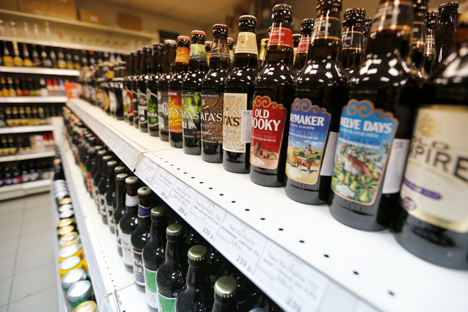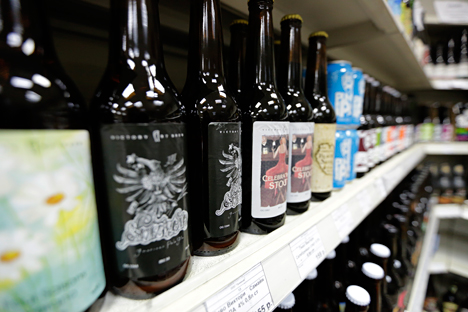Real ale revolution brewing in Russia’s beer industry

Fans of craft beer in Russia can only buy it in special stores. Source: Slava Petrakina
Craft beer – is it a creative, flavorsome resistance to the bland beer produced by faceless corporations or the overpriced preserve of bearded hipsters?
Whatever reaction those two words prompt in your head, there’s one link you almost certainly don’t think of – Russia.
Yet exotic hops and citrusy pale ales have now spread from the experimental brewers of Colorado and the fashionable crowd in Brooklyn, all the way to Russia’s sprawling cities and snowy steppes.
Frosty relations between the Russian and U.S. governments are not stopping inspiration from the States reaching Russian brewers like Nikita Filippov, one of a trio of friends behind AF Brew, a two-year-old startup producing fiercely hoppy India pale ales in St. Petersburg.
“Originally it was just an extension of our beer-drinking and beer-traveling hobbies,” he told RBTH, a reaction to the locally-made “tasteless, industrial pale lagers” packing the shelves of Russian supermarkets – think Miller Lite with Cyrillic writing on the label.
“Our first ever slogan was ‘We're brewing beer that nobody brews, and if nobody likes it we are the ones who will enjoy it,’” he said.
“We seriously thought that we would drink the first 500-liter batch of Ingria IPA in case the whole idea fails."
Needless to say, that didn’t happen. AF Brew – the initials stand for Anti-Factory in opposition to the industrial beer giants – is now firmly established as among the vanguard of Russian craft brewers.

Russian craft beer on a store shelf. Source: Slava Petrakina
St. Petersburg, historically Russia’s window on Europe, saw the first flourishes of Russian craft brewing around a decade ago, but now exciting, well-traveled young brewers are setting up shop around the country and setting up creative collaborations with foreign stars of craft brewing.
St. Petersburg was Russia’s Tsarist-era capital, but the industrial Urals city of Yekaterinburg became its antithesis when the revolution came - it was the city where the royal family was shot dead. Now solidly working-class Yekaterinburg is a craft beer center too. Local brewer Jaws, based near a Soviet-era nuclear power plant, has spent the last five years producing flavorsome American-influenced beers with label designs drawn from Hawaiian surf culture. Even the brewery’s name is borrowed from a powerful wave off Maui.
Other up-and-coming Russian brewers include LaBEERint from the central city of Kaluga and Martin, based in a village in southern Russia, whose innovative lagers were a big hit when the company set up a bar near the hotels for foreign journalists at the Sochi Olympics.
Moscow remains something of a black hole, despite being easily Russia’s largest city with a population of around 12 million. It’s not yet quite clear why craft beer has yet to conquer the capital, but Moscow’s smattering of craft beer shops and its fashionable bars, like the brightly-colored downtown hipster den Entuziast, tend to stock bottles of St. Petersburg and Yekaterinburg brew, if they offer any independent Russian beer at all. Even there, things are changing. The bar at popular concert venue 16 Tonn, modeled on an English pub with wood panelling and stained glass, has a window offering drinkers a view of the fermentation tanks of its own in-house brewery.
One thing brings all of Russia’s craft brewers together, though - a revolutionary spirit.
“We wanted our craft beer to become a part of a lifestyle for creative and non-conformist young people in Russia - like it was with foods, music, movies, clothes and gadgets,” AF Brew’s Filippov says. “We took a lot from American craft brewing tradition, and we still lean towards American brewing style and innovations - beer styles, ingredients, label designs.”
“At the same time we realize that we operate in Russia and the majority of our customers are Russians; many things that took decades to develop everywhere else may only take years here.”
The fruits of the revolution don’t come cheap, though. Once it has completed the almost 900-mile journey by road from Yekaterinburg to Moscow, a bottle of Jaws’ signature American Pale Ale costs 160 rubles ($4) in a shop, rising to $6.30 or so in a bar.
That price difference has opened up a gap for Russia’s brewing establishment, which like the old guard in any revolution, is trying to exploit the trend.
St. Petersburg’s vast Baltika company makes almost half of the beer sold in Russia, most of it the industrial lagers craft brewers oppose. Multinational brewing giant Carlsberg completed a buyout of Baltika’s shares in 2012, around the same time that AF Brew’s insurgents were getting started on the other side of town. Now, however, even Baltika is discovering a bit of craft spirit.
In March, it launched two beers branded “Brewer’s Collection,” one a tasty, citrus-flavored “California light,” the other a rather insipid “Viennese”-branded lager. Retailing at around $1.50 in supermarkets, they may not be craft, but they at least show a major brewer providing its customers with beer varieties they may not be able to otherwise afford. On anecdotal evidence gathered from my Moscow friends’ fridges, they’re pretty popular.
Unlike Baltika’s typical mass-market lagers, the beers in the new “collection” sport labels that discuss hops, malt and fermentation. While many Russian beer-drinkers may not be able to afford experimental craft brews every day, they are increasingly aware of how good beer is made, and advertisers are targeting them.
If beer enthusiasts are now part of the Russian mainstream, where does that leave the revolutionaries? Nikita Filippov has the answer.
“We must keep rolling 24/7 and keep coming out with new beers, crazy flavors, unusual ingredients, collaborations and events every day,” he said. “And that's what we do.”
All rights reserved by Rossiyskaya Gazeta.
Subscribe
to our newsletter!
Get the week's best stories straight to your inbox


